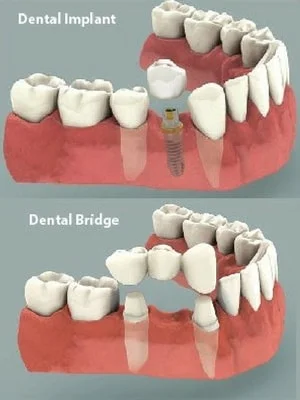id=”title-1″>Dental Implant vs Bridge
Choosing between a dental implant and a bridge for missing teeth can greatly affect how your smile looks and works. Each choice has its benefits and factors to think about. Assessing them carefully is important for your dental well-being.
Delving into Dental Implant Vs Bridge
Dental Implant Vs Bridge serve as artificial tooth roots, providing a sturdy foundation for replacement teeth. Surgeons surgically embed these titanium implants into the jawbone to mimic the natural tooth structure. The process unfolds over several stages:
- An initial consultation to assess suitability and plan treatment.
- The surgical placement of the implant into the jawbone.
- A healing period during which the implant integrates with the bone (osseointegration).
- The attachment of an abutment and artificial tooth or teeth to the implant.
One of the primary benefits of dental implants is their permanence. Once integrated with the jawbone, they provide exceptional stability and durability, resembling natural teeth in appearance and function.
Examining Dental Bridges
In contrast, dental bridges consist of artificial teeth (pontics) supported by adjacent natural teeth or implants. Traditional bridges involve reshaping the adjacent teeth to accommodate dental crowns, which serve as anchors for the pontic.
The process of obtaining a bridge typically includes:
- Getting Ready for the abutment teeth by removing enamel.
- The team takes impressions to create the bridge.
- Transient bridge placement while awaiting the permanent one’s fabrication.
- Final placement and adjustment of the bridge.
Dental bridges offer a non-surgical alternative for replacing missing teeth, restoring bite function, and enhancing aesthetics. However, they may require replacement every 5-15 years, unlike implants, which can last a lifetime with proper care.
Comparing the Two Options
When weighing the pros and cons of dental implants and bridges, several factors come into play:
- Longevity: Implants typically last longer than bridges, potentially providing a lifetime solution.
- Implants are more stable than bridges because they fuse with the jawbone, while bridges need support from nearby teeth or implants.
- Oral Health: Implants help preserve bone structure and prevent bone loss, which may occur with bridges over time.
- Implants look more natural because they replace the whole tooth, including the root, giving a seamless appearance. Both options can look natural, but implants are better for aesthetics.
- Bridges may appear less expensive initially. However, implants could be a better choice in the long term. This is because they have lower maintenance costs and a longer lifespan.
Ultimately, the choice between dental implants and bridges depends on individual circumstances and preferences. Factors such as oral health, budget, and desired aesthetic outcome play crucial roles in the decision-making process.
Making an Informed Decision
Before choosing, talk to a dentist to create a plan for your dental needs. Getting personalized advice before making a decision is important. Key considerations include:
- Your overall oral health, including gum condition and bone density.
- The number and location of missing teeth.
- Your budgetary constraints and insurance coverage.
- Your preference for a surgical or non-surgical approach.
- Your desired aesthetic outcome and long-term goals.
To make the best choice for your smile and health, carefully consider these factors and talk to a dentist. This will assist you in determining what is most suitable for you.
Conclusion
Deciding between dental implants and bridges is important and can impact your oral health and quality of life significantly. While implants offer unparalleled stability and longevity, bridges provide a non-surgical alternative with quicker results.
Choosing dental restoration can boost your confidence, improve mouth function, and enhance overall well-being. A good dentist can help you achieve the smile you desire and maintain healthy teeth for years to come.
Choosing dental restoration can boost your confidence, improve mouth function, and enhance overall well-being. A good dentist can help you achieve the smile you desire and maintain healthy teeth. Knowing your options is important to make the best decision for your oral health.You can reach us at 847.740.4600 and 847.986.6682.




